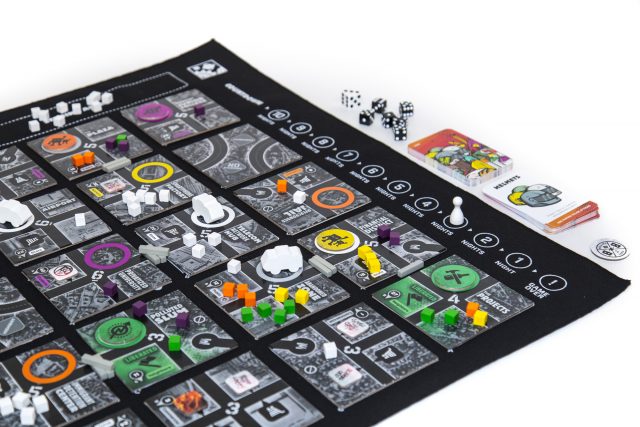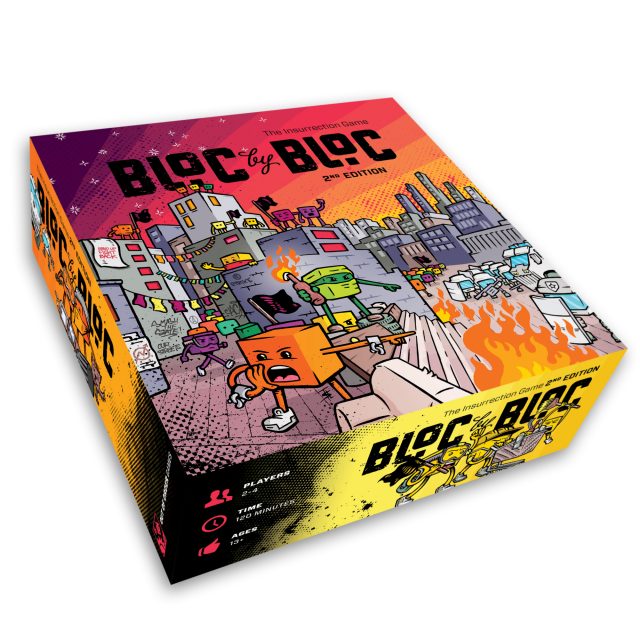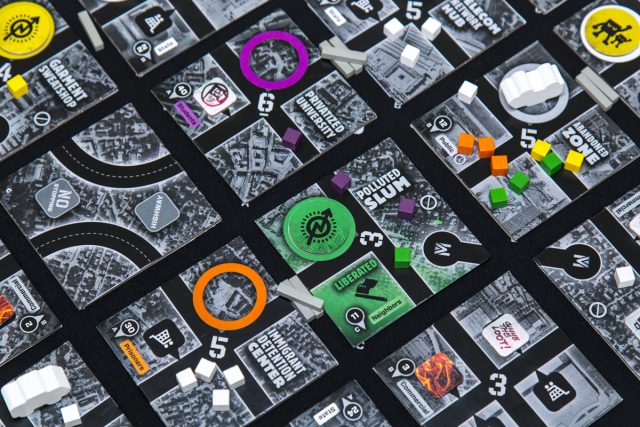Is designing a boardgame on a controversial topic in bad taste? Are there some themes that are “beyond the pale”? Does “gaming” a subject trivialize or mock it–or does it provide valuable opportunities for discussion?
These are all questions which I’ve thought about many times over the 40-odd years I’ve been gaming seriously. I’ve played and enjoyed games about The Black Plague, slavery in the United States, the rise and fall of a First Nation empire in North America, and the sacking of the Roman Empire. And I grew up on a steady diet of conflict simulation games which looked at war from a comfortably abstract and removed point of view.
In fact, The Rise and Decline of the Third Reich was the third wargame I ever bought. I still remember the time when I was ten, on the subway with my family visiting New York City, when I was reading the rules and someone asked me conversationally if I was a Nazi. My father (a Holocaust survivor) leapt in to answer the question, and I’m sure he was horrified–not just at the situation, but also that his son was essentially playing games about a horrific part of his life. It was only years later that I figured out that my passionate interest in WWII was in some part my attempt to understand my father through the forces and events that had made him who he was.
All this came back to me on a whole different level about ten years ago when one of my new boardgaming friends and I were talking about the then just-released Imperial. In this game you play an investor toying with the fortunes of 19th-century Europe for your own personal gain. I had played it a couple of times and really enjoyed it, but something had been gnawing at me from the edges of my consciousness. It took awhile to figure out what it was, and it was this: the idea that a group of international investors with no national allegiance was/is pulling the strings behind the scenes is a classic anti-Semitic trope. It’s an excellent game, and I don’t think that liking it makes you an anti-Semite. I have zero evidence the designer Mac Gerdts even thought about that let alone believed it. There is nothing in the game’s rules or art that connects those dots. And yet…the game still gave me the willies. And still does.
Even the most popular tabletop games around have thematic issues. Back in 2003 controversy erupted on BGG over the theme and mechanisms of Puerto Rico–ie, some people weren’t fooled by the use of the term “colonists”. The pieces were dark brown, anonymous, and served at the pleasure of their player-masters. And little over a year ago Nicole wrote about a project aimed at unpacking the “Settlers” part of Catan.
In the last few years more designers have grappled with how to “gamify” certain issues in a way which does not demean or trivialize them. For instance, GMT games have put out Navajo Wars and Comancheria, solitaire games which I believe are not only challenging and fun but also well-researched and (I believe) do a good job of educating players about these cultures as well as putting them in a position to empathize with the terrible challenges these cultures faced once they came into conflict with European powers.
Another example is the recent second printing of Endeavor. It takes pains to address the issue of the slavery cards in the game with an extensive note in the rules addressing the reality of slavery and directs interested players to the website of the National Underground Railroad Freedom Centre (www.freedomcenter.org). Even though Endeavor is a Euro and not a consim, the publishers chose to embrace the possibilities of tabletop gaming as an educational experience.
 And so now I come around to this week’s game: Bloc by Bloc: The Insurrection Game. This is a game where the first player is chosen according to who most recently had a negative experience with law enforcement, so you know something is going on.
And so now I come around to this week’s game: Bloc by Bloc: The Insurrection Game. This is a game where the first player is chosen according to who most recently had a negative experience with law enforcement, so you know something is going on.
In Bloc by Bloc (BbB hereinafter), players take the role of societal factions (workers; neighbours; students; prisoners) attempting to take back their city from a repressive (and unnamed) regime. In theory they have ten turns to win, but in practice as you’ll see below it’s fewer turns than that. However, each player is secretly assigned a role at the start of the game, and while most of the roles are strictly co-operative there are two with their own victory conditions, which means it is possible that there could be interfactional fighting.
The board is a grid of semirandomly-distributed District tiles connected by roads. Some are Friendly to one faction or other, some are neutral, and some belong to the Police. Turns are split into nighttime and daytime phases. Players act at night, moving around the city grid, recruiting, building barricades, looting, fighting riot cops, and triggering movement and the spawning of new police units.
After all players have acted, the police get to attack–and they don’t pull any punches. If enough blocs survive, factions can Liberate districts, which not only makes it easier to do stuff there, but also gives the players a powerful (but random) bonus. Liberating Districts is costly and players don’t need to do so to win the game; on the other hand, the bonuses they get are pretty sweet, so winning without Liberating any Districts would be quite a challenge.
Then Police morale is checked. Morale goes up due to random events and down when you eliminate squads or (even better) police vans. The higher police morale, the more cards they draw in the daytime AND (and this is a killer) the more spaces the turn marker moves–which can make the game very short if factions don’t get their s*** together fast enough.
BbB is an excellent game with high-quality components, a very well-written set of rules, and tense gameplay even if all players are co-operating. The police AI moves unpredictably and strikes with deadly force. Each faction has a special power which must be used to its limit: neighbours build barricades quickly, slowing cops down; prisoners are great in combat; students have high mobility; workers set up cadres (the game calls them Occupations) more efficiently. Although cops are powerful they can (must) be lured out of their power centres and picked off in smaller groups. Players have to gather and strike quickly and then melt away.
The one thing–the only thing–that gives me pause about recommending BbB wholeheartedly to everyone is the questionable taste of the theme of the game. I am all in favour of broad social movements, but (bourgeois as I am) violence and property destruction scare me–and furthermore I believe history shows they are counterproductive as they invite repression and provide an excuse for people to disown progressive movements. Yes, I know the media is complicit with this, but I don’t believe that changes the political reality.
End of rant.
Meanwhile, in BbB the artwork is full of these very cute cuboid creatures (the “blocs”) throwing Molotovs, burning tires, and looting. All very adorable…except if you stop to think about the real-life equivalents. I know, I know, it’s just a game, I’m overthinking it. Jeez, Risk is about world domination, dude. Get over yourself.
Yeah, except…Risk is a very abstract, strategic game, where players fly high above the action on a map spanning the entire world. BbB gets down to the nitty-gritty of organizing, barricading, and looting. In BbB no one gets hurt but the police, and looting has no long-term consequences (and can get you the swag you need to even the playing field). Windows may get smashed but no innocent bystanders get hurt or see their stored emptied out by vandals.
BbB paints a pretty unmessy picture of social change: “We’ll take down The Man and then everything will be All Right.” Actually, the one thing I really like about BbB is the hidden role/traitor mechanic, because that gives players a taste of the factionalism and back-stabbery that has unfortunately dogged most post-Enlightenment revolutions (on the left and right).
In the end, as I said at the top, a game like BbB can be a great conversation-starter and educational tool. As for whether the game is in good or bad taste, I have no doubt some will have no problem with it and some will reject it out of hand without playing it. I would advocate for trying it at least once and seeing for yourself.
Daily Worker Placement thanks Out of Order Games for providing a review copy of Bloc by Bloc.
Thanks for your review. I supported this game on kickstarter and love it. I respect that you at least recognize how your bourgeois class interests color your perspective. That said, your criticisms of the game’s theme are fairly unfounded, and your understanding of history is naive and wrong.
Contrary to your assertion, almost every successful social insurrection or revolution in history involved “violence and property destruction.” French Revolution? Boston tea party? Civil War? Civil rights movement? Women’s suffrage? Gay rights? Labor rights? Look into the history of any of these movements and you will find violence, militancy, and direct action as the prime movers of change.
This does not “invite repression”; repression of working class movements does not need or wait for any invitation. It is a constant background condition under which such movements must operate and to which they are obligated to respond in kind.
> In BbB no one gets hurt but the police
The police are the main antagonist and remove your blocs constantly in clashes. I can’t imagine how else the game could incorporate the idea of police brutality against activists than removing your blocs and being the ultimate cause of losing conditions.
> looting has no long-term consequences
What long-term consequences are you thinking that looting has in real life that the game should have displayed? The game depicts the main consequence: people in the community get to reappropriate some commodities, at the risk of police brutality. The only other “long-term consequence” I can imagine amounts to an incredibly wealthy landlord or business owner having to pay a slightly higher insurance rate.
This is a great game, and the greatest part of it actually is the theme. It stands head and shoulders above most other board games that, as you noted, traditionally have reactionary themes of imperialism and colonization. Ironically, I consider this game in better “taste” than many if not most of the others you named in this article.
Thanks for the thoughtful and in-depth response, Tony! I think that’s exactly the sort of thinking and discussion the designers were hoping would hope come out of playing the game. And as you’ve clearly proved the game is a success on that front, as well as being a really good game. For the record, I completely agree that real and meaningful social and economic change is (unfortunately) impossible without some amount of turmoil and sacrifice. I just wish sometimes it could all be done by sitting at a table and playing boardgames instead.
-David
I am very late to this party, but it is ironic to me that the reactionary themes that Tony pointed out dominate tabletop gaming **actually are** mostly committed by people sitting at a table and playing, what is to them, games of power and wealth. Not to ignore the role of the foot-soldiers carrying this out on the ground, but these are deliberate processes that are run by people who sit at desks in the tower offices of bourgeois government and international commerce.
BbB is as divorced from the physical reality of revolutionary movements, as games like Risk and Monopoly are similar to the running of wars or real estate holdings.
I haven’t played this game but I can’t wait to try it out. Thank you for the thoughtful review.